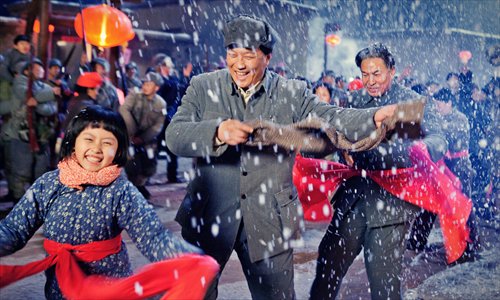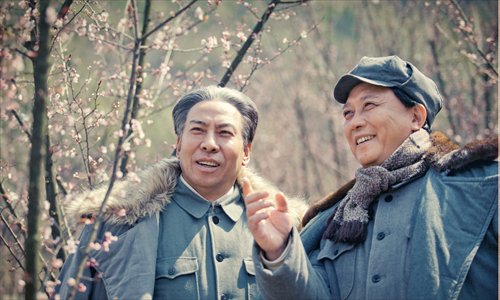Chronicles of the Chairman
By Lu Qianwen Source:Global Times Published: 2013-12-26 21:03:01
Daily Special: Mao's 120th anniversary marked with events nationwide


And with indications sent in early November by the central government that all the memorial activities for Mao's 120th birthday should be elaborate yet retain a simplistic approach, audiences have had a chance to review his achievements through a series of low-key, but meaningful events.
Among these memorial activities, a TV series named Mao Zedong offers a closer and more comprehensive perspective on the life of the former leader. The show premiered on CCTV-1 and Hunan TV channels on Wednesday.
With the first part consisting of 50 episodes, the TV drama is directed by award-winning director Gao Xixi, who has been behind several famous TV shows such as The Sky of History (2004), Happiness as Flowers (2005) and Romance of the Three Kingdoms (2010).
Scheduled for a production of 90 episodes and divided into two parts, the series covers Mao's entire life.
The first part details events from Mao's birth in 1893 to the founding of the People's Republic of China in 1949, showing his great revolutionary aspirations and the struggles of the Communist Party of China.
"Looking into mountains of materials in nearly two years, we tried to present more details of Mao's life in order to bring him closer to the common people," Gao told the Global Times.
Gao also revealed details of the second part of the series, which is planned to include a further 40 episodes, and is still in the phase of script writing due to difficulties in portraying Mao's influence during this complicated period of China's modern history.
In fact, many viewers already have a clear image of Mao through the numerous screen portrayals of him in his younger years and middle age.
Different historically significant events like the Long March (1934-36) and The Three Campaigns (1948-49) have in one way or another presented Mao's great military talent and chrisma.
"But in a serial based on Mao himself, how to set the tone and define him at the beginning is the most difficult part," said Huang Hui, the scriptwriter of Mao Zedong, who has also written many Mao-related screen works before, such as A Dream of Youth (2007) and Stories of Mao Zedong's Remains (2010).
"Mao and these revolutionary pioneers fought a way out for the country, making it possible to survive, develop independently and even become strong again," Huang added.
One of the most distinguishing features of Mao was that he was consistently fighting for the interests of the most vulnerable groups, Huang noted.
Based on the balance of these two aspects of his life, the TV series Mao Zedong can be defined on one hand as an in-depth adaptation of national modern history, and on the other as a chronicle of a civil hero.
A love for the common people
With nearly 1,000 cast members and equipped with over 100 million yuan ($16.47 million) in investment for the first 50 episodes, the big-production underscores this historically great man in a most comprehensive way possible.
However, as the director reiterated, what he wants to highlight most is Mao's ordinary and easy-going side.
"He is a very broad-minded man and only by thinking of people all the time in his mind, he was able to fight for their interests," said Gao.
In the series, there are many scenes that show his connections with ordinary people.
For example, in a plot where Mao was engaging in a conversation with a farmer, the latter accidently sat on an egg and broke it. Much to his surprise, Mao bluntly asked him to pay for it.
Mao then explained that by asking the farmer to pay for the egg, it was the same trick as a landlord asking his tenants to pay rent for their land.
Since the farmer did not have any chickens and couldn't pay what he had broken, he would have to borrow money from his landlords as he had no other means to compensate them, resulting in the farmers' amassing a debt that would never truly be paid off.
In this way, Mao managed to awaken the farmer's awareness of the backward feudal system, showing how a simple analogy could drum up the fundamentals of the revolution.
Catering for foreigners
As this big production is dedicated to Mao's 120th birthday, Mao Zedong is not only being aired in China, but will be shown overseas as it is being translated into English, Russian, Arabic and French.
The series will also soon make its debut on the UNB network in Hong Kong.
As the first TV series on Mao to be introduced to the overseas market, Mao Zedong is expected to enrich many foreigners' impressions about this historical figure.
"Actually in the West, some people in areas such as the North America, have even stronger feelings for Mao than us," said Gao.
"When history begins to draw distance from us, we can have a clearer and more comprehensive view about historical figures," said Li Zhun, who is a cultural critic on a forum on the broadcast of Mao Zedong.
"The evaluation benchmark for them lies not in what they have contributed to the society, but in how much more they have contributed when compared to their predecessors," said Li.

A scene from TV series Mao Zedong Photo: Courtesy of Heguang Media, one of the producers of Mao Zedong.

A scene from TV series Mao Zedong Photo: Courtesy of Heguang Media, one of the producers of Mao Zedong.
As December 26 marked the 120th anniversary of Chairman Mao Zedong's birth, memorial activities around the country have been taking place this week, including concerts, exhibitions and galas held in his honor.And with indications sent in early November by the central government that all the memorial activities for Mao's 120th birthday should be elaborate yet retain a simplistic approach, audiences have had a chance to review his achievements through a series of low-key, but meaningful events.
Among these memorial activities, a TV series named Mao Zedong offers a closer and more comprehensive perspective on the life of the former leader. The show premiered on CCTV-1 and Hunan TV channels on Wednesday.
With the first part consisting of 50 episodes, the TV drama is directed by award-winning director Gao Xixi, who has been behind several famous TV shows such as The Sky of History (2004), Happiness as Flowers (2005) and Romance of the Three Kingdoms (2010).
Scheduled for a production of 90 episodes and divided into two parts, the series covers Mao's entire life.
The first part details events from Mao's birth in 1893 to the founding of the People's Republic of China in 1949, showing his great revolutionary aspirations and the struggles of the Communist Party of China.
"Looking into mountains of materials in nearly two years, we tried to present more details of Mao's life in order to bring him closer to the common people," Gao told the Global Times.
Gao also revealed details of the second part of the series, which is planned to include a further 40 episodes, and is still in the phase of script writing due to difficulties in portraying Mao's influence during this complicated period of China's modern history.
In fact, many viewers already have a clear image of Mao through the numerous screen portrayals of him in his younger years and middle age.
Different historically significant events like the Long March (1934-36) and The Three Campaigns (1948-49) have in one way or another presented Mao's great military talent and chrisma.
"But in a serial based on Mao himself, how to set the tone and define him at the beginning is the most difficult part," said Huang Hui, the scriptwriter of Mao Zedong, who has also written many Mao-related screen works before, such as A Dream of Youth (2007) and Stories of Mao Zedong's Remains (2010).
"Mao and these revolutionary pioneers fought a way out for the country, making it possible to survive, develop independently and even become strong again," Huang added.
One of the most distinguishing features of Mao was that he was consistently fighting for the interests of the most vulnerable groups, Huang noted.
Based on the balance of these two aspects of his life, the TV series Mao Zedong can be defined on one hand as an in-depth adaptation of national modern history, and on the other as a chronicle of a civil hero.
A love for the common people
With nearly 1,000 cast members and equipped with over 100 million yuan ($16.47 million) in investment for the first 50 episodes, the big-production underscores this historically great man in a most comprehensive way possible.
However, as the director reiterated, what he wants to highlight most is Mao's ordinary and easy-going side.
"He is a very broad-minded man and only by thinking of people all the time in his mind, he was able to fight for their interests," said Gao.
In the series, there are many scenes that show his connections with ordinary people.
For example, in a plot where Mao was engaging in a conversation with a farmer, the latter accidently sat on an egg and broke it. Much to his surprise, Mao bluntly asked him to pay for it.
Mao then explained that by asking the farmer to pay for the egg, it was the same trick as a landlord asking his tenants to pay rent for their land.
Since the farmer did not have any chickens and couldn't pay what he had broken, he would have to borrow money from his landlords as he had no other means to compensate them, resulting in the farmers' amassing a debt that would never truly be paid off.
In this way, Mao managed to awaken the farmer's awareness of the backward feudal system, showing how a simple analogy could drum up the fundamentals of the revolution.
Catering for foreigners
As this big production is dedicated to Mao's 120th birthday, Mao Zedong is not only being aired in China, but will be shown overseas as it is being translated into English, Russian, Arabic and French.
The series will also soon make its debut on the UNB network in Hong Kong.
As the first TV series on Mao to be introduced to the overseas market, Mao Zedong is expected to enrich many foreigners' impressions about this historical figure.
"Actually in the West, some people in areas such as the North America, have even stronger feelings for Mao than us," said Gao.
"When history begins to draw distance from us, we can have a clearer and more comprehensive view about historical figures," said Li Zhun, who is a cultural critic on a forum on the broadcast of Mao Zedong.
"The evaluation benchmark for them lies not in what they have contributed to the society, but in how much more they have contributed when compared to their predecessors," said Li.
Posted in: Film